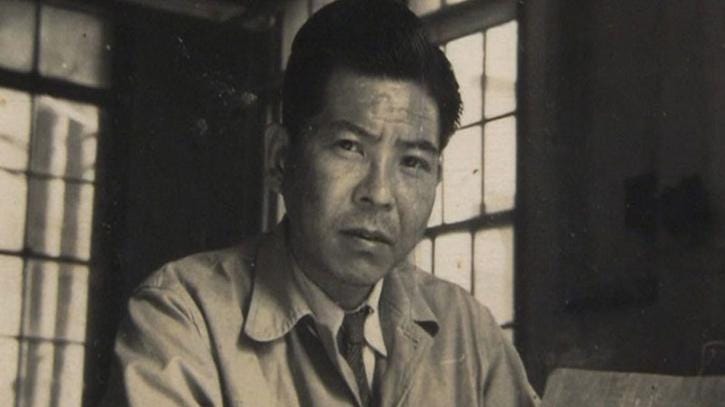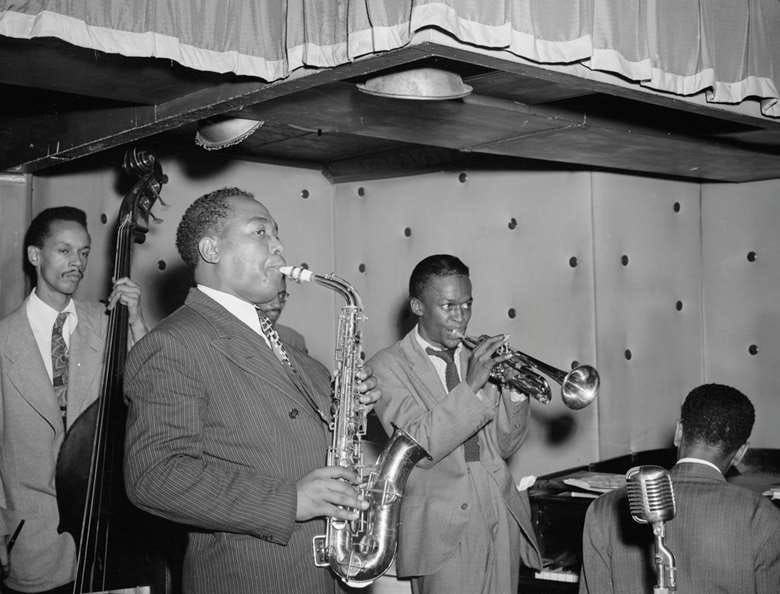Hi there👋 Building Blocks is a weekly roundup of content to prickle your mind.
Today’s stories in a nutshell (1-2 minutes each):
💣 The tale of Tsutomu Yamaguchi
🤣A joke
🎺 Smokey jazz bars
📺 Pain sponges (SUCCESSION SPOILER ALERT)
*To have a smoother reading experience, I recommend reading the article in your browser. To do so, click on the heading.
**🙏🙏 Please click on the polls after each article. Your feedback is gold.
💣 History: A story about an atom bomb whisperer
Meet Tsutomu Yamaguchi.
On 6 August 1945, this Japanese gentleman was on a business trip for his employer, Mitsubishi Heavy Industries. What was the destination?
Hiroshima.
That morning, U.S. Colonel Paul Tibbets, the captain of Enola Gay (a plane), dropped “Little Boy” (a bomb) only 3km from Yamaguchi. Hiroshima was vapourised, but Yamaguchi remained standing. Over 70 000 people did not.
Badly burned and temporarily blinded, he spent the night in a bomb shelter before hopping on a train to his hometown the next day. The name of his hometown…
Nagasaki.
If you know your World War II history, you might see where this is going.
Two days later, bandaged like a mummy, Yamaguchi hobbled to work. You’d think surviving an atomic bomb would warrant a day off, but in 1945 Japan, apparently not.
At work, his bosses called bullshit on his story of a bomb flattening an entire city. But as he was recounting what had happened in Hiroshima - as if right on cue - a bright white light interrupted his tale.
On 9 August 1945 at 11:01 AM, Bockscar (another plane), piloted by U.S. Army Air Force Major Charles Sweeney, dropped “Fat Man” (another bomb) on Nagasaki. The bomb was even more powerful than Little Boy. Over 60 000 people died.
And Yamaguchi? Nope, still standing.
Death only caught up with him 65 years later, in 2010, when he died of cancer. In Japan, he became known as "nijū hibakusha" - the double survivor.
So, the next time you're moping about your tough week at work, think about this: if Tsutomu Yamaguchi could soldier through a week of double atomic devastation, your odds of getting through your challenges are looking pretty good.
🤣 Comedy: Joke of the week
“When I said I wanted to be a comedian they laughed.
Well, they’re not laughing now. “
— Bob Monkhouse
🎺 Weekend Album: Kind of Blue, Miles Davis
“Man, sometimes it takes you a long time to sound like yourself.” ― Miles Davis
Have you ever listened to an album that, like a musical fountain of youth, refuses to grow old no matter how many times you've played it?
To me, that's the magic of "Kind of Blue", the 1959 masterpiece by Miles Davis. The album is a beacon in the jazz world, frequently cited as the best jazz album of all time.
Each play reveals another layer of the record’s rich tapestry, like a stranger gradually opening up over drinks. The album is more than music; it's a mood. It’s cool and smooth and paints pictures of late-night cityscapes and silhouetted figures in smoky jazz clubs.
Listening to it makes you want to drink whiskey…even if it’s 9 o’clock on a Monday morning.
Kind of Blue departed from mainstream jazz before its time. Shifting from the complexity of bebop and hard bop, Davis introduced the world to modal jazz. Here’s how jazz evolved in the 1940s and 50s:
Bebop: Complex, fast-paced, and intricate jazz style focused on improvisation and known for its non-danceable, "musician's music" nature. Example:
Hard Bop: A reaction to bebop, featuring more accessible, soulful music with a stronger emphasis on composition, drawing heavily from blues and gospel traditions. Example:
Modal Jazz: A shift to slower, simpler harmonic structures, emphasising mood and atmosphere, allowing for deeper exploration of scales, and providing more melodic freedom for musicians. Example:
Born in a small town in Illinois in 1926, Davis was gifted a trumpet by his father for his thirteenth birthday. This trumpet was his passport to the bustling St. Louis jazz clubs, where he first tasted the thrill of the genre he would come to redefine.
Moving to New York City in 1944 to attend the Juilliard School, Davis soon succumbed to the call of the city's vibrant jazz scene. Dropping out of Juilliard, he honed his craft alongside legends like Charlie Parker and Dizzy Gillespie.
But Davis's life was not all stardom and spotlights.
His ascent to fame coincided with a descent into heroin addiction. Beginning in the early 1950s, this struggle overshadowed his success. His performances dwindled, his reputation waned, and he faced periods of professional stagnation. It was not until 1954 that he emerged from this darkness, marking a significant milestone in his personal and professional journey.
Further turbulence shadowed Davis's personal life. He had three marriages, all marked by discord. He admitted to abusive behaviour in his autobiography, adding a disconcerting layer to his legacy.
In 1959, at the pinnacle of his career, Davis fell victim to a brutal police assault. This harsh encounter underscored the era's racial prejudices, inciting Davis to declare, "It changed the way I felt about a lot of things."
Davis released over 100 albums during his career, pocketing 8 Grammy Awards along the way. He passed away on 28 September 1991.
Do yourself a favour and listen to this album this weekend.
Preferably with a whiskey in hand.
📺 Life: Are you someone’s pain sponge? (SUCCESSION SPOILER ALERT)
The HBO hit series Succession ended last month. The more I think about the final episode, the more genius I think it was. One scene, in particular:
In the scene above, Lukas Matsson, the eccentric tech billionaire, interviews Tom Wambsgans to take over the business’s American operations. Matsson pushes Tom, a known brown nose, to his limits to understand how far he will go to secure the CEO role. Matsson even casually floats the idea of having sex with Tom’s wife. To which Tom, visibly upset, can only nod and respond in gibberish.
Matsson then goes further:
Matsson: I'm not looking for a partner. You know? I'm looking for a front man.
Tom: Mm-hmm.
Matsson: 'Cause, um... we're gonna cut shit close to the bone. We're gonna get right fucking in there. It's gonna get nasty. Uh... So I need a pain sponge... when I'm under the hood doing... (Growls ) what I love, you know?
Tom: Sure.
Mattson: That's kind of what I'm after. So, would that be a problem?
Tom: Nah. No, man. Nah. I could do it.
I wonder how many people unwittingly spend their careers being pain sponges? Especially in the corporate world. But perhaps, if you wish to succeed, the life of a pain sponge is inevitable.
To see a real-life and trending pain sponge, read the news analysis about Jay Monahan, the PGA Tour’s commissioner who, this week, announced the merger between the PGA Tour and Saudi-backed LIV Golf.
Monahan made a complete U-turn after months of taking the moral high ground against the Saudis. He even brought terrorism and 9/11 into the debate, imploring PGA players to take the same ethical stance. The players who stuck with the PGA Tour and supported Monahan lost out on millions of dollars.
The deal seems to make business sense, but Monahan, very publically, sold his soul to the highest bidder, and social media has turned him into a punching bag. Aka, a pain sponge.






